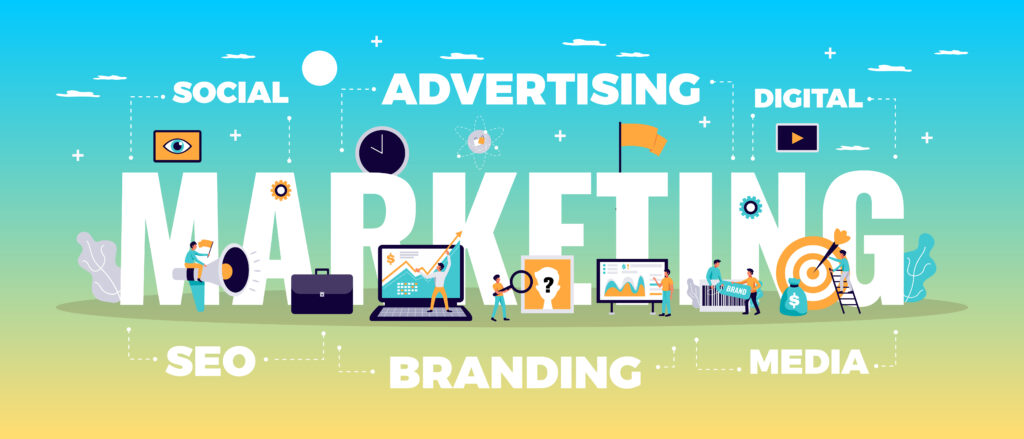The world of marketing has undergone a seismic shift in the wake of the COVID-19 pandemic. As businesses adapt to new realities, marketing strategies and trends have evolved rapidly. In this comprehensive article, we’ll delve into “marketing trends in a Post-COVID World: 14 Trends and Adaptations.” Whether you’re a seasoned marketer or just venturing into the field, this guide
The marketing landscape has witnessed a remarkable transformation in the aftermath of the COVID-19 pandemic. In this section, we’ll explore the 14 key trends and adaptations that are shaping the future of marketing trends.
Table of Contents
The Rise of Digital Dominance
The COVID-19 pandemic accelerated the shift to digital channels. As consumers spent more time online, businesses had to follow suit. Digital marketing became the cornerstone of success. Brands that invested in robust online presence, SEO, and social media strategies reaped the rewards.
Embracing E-commerce
The pandemic forced many businesses to pivot to e-commerce. Even traditional brick-and-mortar stores had to establish online sales channels. The convenience and safety of online shopping are here to stay, making e-commerce optimization crucial.
Content is King, Quality is Emperor
In the post-COVID world, content marketing remains paramount. However, Engaging, informative, and value-driven content is what captures and retains the audience’s attention.
Personalization at Scale
Consumers now expect personalized experiences. AI-driven tools enable businesses to tailor their marketing efforts, creating a sense of connection and relevance.
Video Dominance.
With platforms like TikTok and YouTube booming, brands must invest in video content to engage and entertain their audience.
Social Media’s New Role
Social media platforms evolved into more than just marketing trends; they became lifelines of communication. Brands that embraced authenticity and empathy on social media forged stronger connections.
SEO in the Spotlight
Search engine optimization remains crucial for visibility. As competition online intensifies, businesses must optimize their websites to rank higher on search engine results pages.
Data-Driven Decision-Making
Data has become the driving force behind marketing trends. Harnessing data analytics allows businesses to make informed decisions, allocate resources efficiently, and refine campaigns.
Sustainable and Purpose-Driven Marketing trends
Consumers now favor brands that demonstrate social responsibility and sustainability. Incorporating purpose-driven initiatives into marketing trends strategies resonates with a conscientious audience.
Influencer Collaboration
Influencers continue to hold sway over consumer decisions. Collaborating with the right influencers can amplify brand messages and reach a broader audience.
Agility and Adaptability
The pandemic highlighted the importance of adaptability. Marketing trends must remain flexible to respond to changing circumstances swiftly.
Localization Matters
Localized marketing strategies connect with communities on a personal level. Tailoring campaigns to specific regions or cultures enhances brand relevance.
Privacy Concerns and Ethical Marketing
As data privacy concerns grow, brands must prioritize ethical data practices and transparent communication with consumers.
Augmented Reality (AR) and Virtual Reality (VR)
Brands are using these immersive experiences to engage consumers in novel ways.
Hybrid Events and Experiences
Even as physical events return, the hybrid model combining in-person and virtual experiences is likely here to stay. Brands must navigate this new event landscape.
FAQs
Q: How can businesses adapt to the digital-first landscape post-COVID?
A: To thrive in the digital-first landscape, businesses should invest in a robust online presence, engage in SEO practices, and leverage social media for effective marketing trends.
Q: What role does sustainability play in post-COVID marketing?
A: Sustainability is crucial; consumers favor brands with social responsibility initiatives. Incorporating sustainability into marketing strategies builds trust and loyalty.
Q: How can small businesses compete in the post-COVID marketing landscape?
A: Small businesses can compete by focusing on niche markets, embracing digital marketing, and delivering exceptional customer experiences.

Q: Is video marketing essential for all businesses?
A: Yes, video marketing is essential for engaging modern audiences. Platforms like TikTok and YouTube provide excellent opportunities for brand visibility.
Q: How can businesses stay adaptable in uncertain times?
A: Businesses should maintain flexible marketing trends strategies, closely monitor market trends, and be ready to pivot when necessary.
Q: Are influencer collaborations worth the investment?
A: Influencer collaborations can be highly effective when aligned with the brand’s values and target audience.
Conclusion
In the dynamic landscape of “Marketing trends in a Post-COVID World: 14 Adaptations,” staying ahead requires adaptability, innovation, and a commitment to understanding and meeting evolving consumer needs. By embracing these trends and adaptations, businesses can navigate the challenges of our post-pandemic world and thrive in the new marketing era.